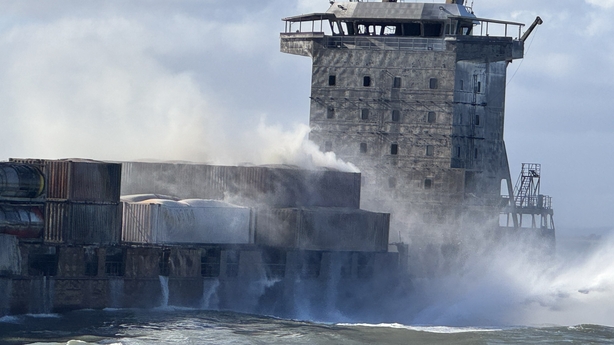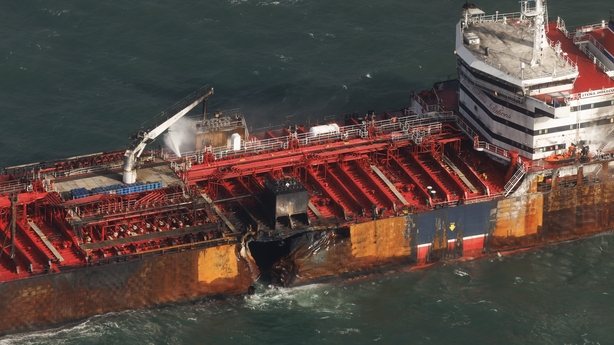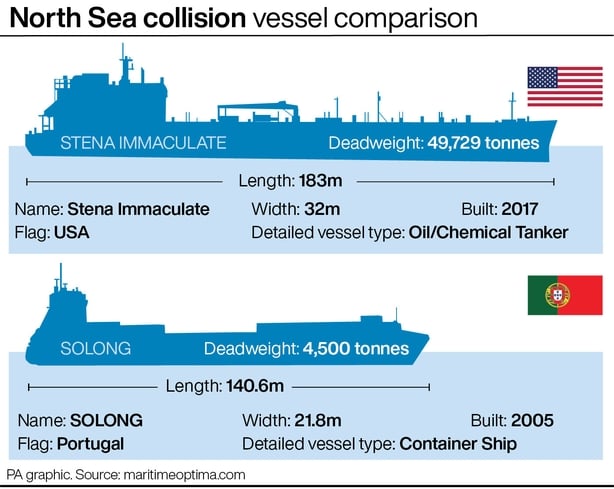A 59-year-old man has been arrested on suspicion of "gross negligence manslaughter" in connection with the collision between a tanker and a container ship in the North Sea yesterday, according to British police.
Two ships burned off the English coast today, a day after the unexplained collision that left a tanker carrying US army jet fuel with a gaping hole in its side and a container ship adrift.
A crew member from the Portuguese-flagged container ship Solong was presumed dead, junior transport minister Mike Kane told parliament.
Thirty-six people were brought ashore following the incident and no others remain missing, the coastguard said.
Detective Chief Superintendent Craig Nicholson said: "Humberside Police have taken primacy for the investigation of any potential criminal offences which arise from the collision between the two vessels.
"Extensive work has already been carried out, and we are working closely with our partners to understand what happened, and to provide support to all of those affected.
"Following enquiries undertaken by my team, we have arrested a 59-year-old man on suspicion of gross negligence manslaughter in connection with the collision, this follows the conclusion of search operations by HM Coastguard for the missing crew member of the Solong."
The tanker Stena Immaculate, which carries jet fuel for the US military, was at anchor when it was struck by the smaller Solong, causing huge fires and explosions, and releasing fuel into the sea.
Aerial TV footage today showed a gaping hole in Stena Immaculate's hull, with fire damage along its length, although the flames that engulfed the vessel after the collision appeared to have subsided.
"The Solong is still alight and the fire on board the Stena Immaculate has greatly diminished. Safety vessels and other vessels with firefighting capabilities are still on scene with more arriving today," the coastguard said in a statement.
The Solong, which appeared badly burnt in separate TV footage, had drifted south overnight, the coastguard said. A one-kilometre (0.62 mile) exclusion zone was placed around both vessels, the statement said.

"Modelling suggests that should the Solong remain afloat, it will remain clear of land for the next few hours," Mr Kane said.
Neither vessel involved was expected to sink, transport minister Heidi Alexander said in a statement this afternoon, citing preliminary assessments following a meeting with the coastguard agency.
Her comments come after Mr Kane earlier told parliament the MV Solong was unlikely to stay afloat.
Equipment to minimise pollution at sea, such as spray dispersants for oil spills and containment booms, were on standby, the British government said.
The potential environmental impact was being assessed, coordinated by the Maritime and Coastguard Agency and an East of England environmental group, and the situation was being monitored overhead by plane, the government added.
The coastguard statement cited the UK Health Security Agency as saying that "any public health risk on shore is currently deemed to be very low".

Authorities and operators of the vessels have yet to offer an explanation of how the crash happened, or why multiple safety systems on board modern vessels failed to prevent the crash.
Data from maritime analytics website Marine Traffic showed the 183-metre (600ft) Stena Immaculate was anchored off Immingham, northeast England, when it was struck by the 140-metre (460ft) Solong, which was en route to Rotterdam.
The Solong was sailing at cruise speed and close to the maximum of around 18-19 knots, shipping sources said today, and the vessel had sailed through the same area on past voyages.
British Prime Minister Keir Starmer's spokesperson said there did not appear to be any suggestion of "foul play" at this time.
The incident was not being treated as a national security issue, British officials said.
Two maritime security sources said there was no indication that malicious activity or actors were involved in the incident.
The Stena Immaculate was carrying 220,000 barrels of jet fuel in 16 segregated cargo tanks, but it was unclear how much of it was spilt after at least one tank was hit, Crowley, the US logistics group which operated the vessel, said yesterday.

Owners of the Solong said the vessel was not carrying sodium cyanide, contrary to an earlier report from maritime data provider Lloyd's List Intelligence, which cited the local coastguard. The owners said they were monitoring four containers which had previously been used to store the substance.
The jet fuel cargo could pollute the sea, harming large colonies of protected seabirds in the area, including puffins and gannets and the fish on which they feed.
The crash occurred yesterday morning in a busy waterway, prompting a significant rescue response from British teams that included aircraft, lifeboats and other vessels.
While Britain's Marine Accident Investigation Branch will gather initial evidence, overall responsibility for investigating the crash lies with the US and Portuguese authorities, the flag states of the vessels.

